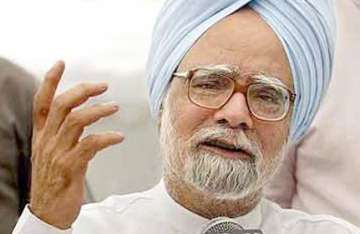PM Admits Failure On Sugar Front
Prime Minister Manmohan Singh on Friday admitted to government's failure on the sugar front which led to steep rise in prices of the commodity and said ways and means need to be explored to see
Prime Minister Manmohan Singh on Friday admitted to government's failure on the sugar front which led to steep rise in prices of the commodity and said ways and means need to be explored to see that crisis does not recur.
"If there is a failure of economic policy, it is with regard to sugar....we have not been able to find a practical and pragmatic way to deal with the cyclical behaviour of sugarcane production," Singh told the Rajya Sabha while replying to the debate on Motion of Thanks to President's Address. "I do admit weakness," he said about the government's failure to realise the cyclical nature of the crop which changes every 2 to 3 years.
His statement assumes significance as Food and Agriculture Minister Sharad Pawar has been attributing the sharp increase in sugar prices to the cyclical nature of the crop.
Pawar has been under attack over food inflation, particularly sugar. Even sections within Congress have been unhappy with his handling of the crisis. While food inflation is still ruling above 17 per cent, sugar prices in particular had touched Rs 50 a kg before declining to Rs 43 per kilo.
The Prime Minister, however, rejected the Opposition charge of a scam in sugar saying exports were negligible and were carried out for meeting the country's international obligations. In the Lok Sabha, he said ways and means had to be found to stabilise the sugar economy. "Opposition smells scam everywhere," the Prime Minister said referring to BJP charge of scam in sugar export.
In November, 2009 sugar exports were merely Rs 7.9 crore whereas imports were Rs 611 crore. Even if the small exports to meet international commitments were not carried out, it would have made a little difference on the price situation.
Singh agreed, "We have to find ways and means to stabilise the sugar economy despite this behaviour and we will explore ways and means that in future a crisis of sugar can be stabilised at reasonable level, unmindful of cyclical nature of production of sugar."
In the Upper House, the Prime Minister expressed displeasure with "lethargy" shown by the states on agricultural extension services which, in the past were hallmark of the Green revolution. He said unless the weakness was plugged, "We will be talking in the air (about raising agri production)."
Singh said the Public Distribution System can be a powerful tool to cushion poor from inflation impact but it is the responsibility of states to weed out bogus ration cards.
He said given the global economic scenario and pressure on commodity prices, the choice before the government was between inflation and unemployment. Singh said had he instructed RBI to take harsher measure and control money supply, poor would have been hit harder.
"The problem of unemployment would have become a mass problem...when the world was experiencing recession, our country still managed to stay afloat. Unemployment situation was not allowed to aggravate," he said. Tight monetary and fiscal measures would have hurt more people, he said and assured the House that the "worst is over" on inflation front. PTI
